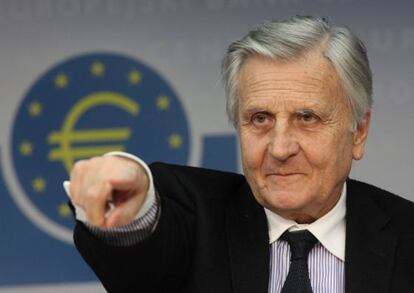Who’s in charge in Spain?
Experts criticize the letter sent by Trichet to Zapatero in 2011 as the euro crisis threatened to dismantle the single-currency bloc

A letter addressed to former Spanish Socialist Prime Minister José Luis Rodríguez Zapatero in August 2011 during the throes of the euro crisis by the then president of the European Central Bank, Jean-Claude Trichet, makes evident the loss of control of the democratically elected governments of the periphery of the single-currency bloc over their own economic affairs, even those that were not in receipt of a full-blown bailouts.
Monetary policy is evidently in the hands of the European Central Bank, while the European Commission has become increasingly demanding of the governments of member countries in terms of fiscal policy and structural reforms, especially in the case of Spain in the wake of the bailout it received to clean up its banking system.
Prior to Trichet’s letter, US President Barack Obama and Chinese Premier Wen Jiabao in May 2010 had quiet words in Zapatero’s ear, as the Spanish prime minister remained in a state of denial about the economic crisis in Spain and only then started to introduce spending cuts as the deficit got out of hand.
But Trichet’s letter, the contents of which were revealed by Zapatero in his memoirs, El Dilema 600 días de vertigo (or, The Dilemma: 600 days of vertigo) published last week, took matters to an extreme and set the agenda for the following 30 months.
“This letter is a humiliation. What’s rare about it is that it is a humiliation that is to a certain extent logical,” a European source said. “On the edge of an abyss, it took the head of the ECB to read the riot act to Spain; Zapatero was still petrified.”
This letter is a humiliation. What’s rare about it is that it is a humiliation that is to a certain extent logical”
The experts consulted for this article draw a number of different conclusions about the letter, one of which is that it was unacceptable of Zapatero not to reveal its contents to parliament at the time. Another is that it served to get the Socialist leader to stick to the script marked out by Trichet, with his successor Mariano Rajoy following the directives of the ECB almost to a tee.
Experts also believe the tone of the letter went way beyond the scope of Trichet’s mandate at the ECB, transforming him into a political animal of dubious democratic qualifications, with explicit and direct orders to a democratically elected government and a supposedly sovereign parliament.
Another conclusion that has been drawn is that some of Trichet’s recipes were debatable and left him among the most hawkish of the many hawks in Europe, demanding cutbacks “whatever the circumstances,” something that Brussels no longer defends.
“It is the Commission, and in part, the European Council that should impose conditionality in Europe, not the ECB,” says Guntram Wolff, the director of the think-tank Bruegel, whose chairman is Trichet himself. “But the Commission then did not have the instruments or the necessary political credibility.”
Paul de Grauwe of the London School of Economics goes further, describing the letter as a “nightmare.” De Grauwe says that as an independent body, the ECB does not take instructions from anyone, while the opposite side of this independence is that it should not get involved in the terrain of other institutions such as a democratically elected government or parliament.
Charles Wyplosz of the Graduate Institute in Geneva says the ECB taking on the role of the “bad cop” is a “major error” which, rather than reinforcing the institution’s power, debilitates it by dynamiting its independence.
The only justification some experts find for the tone of some parts of the letter is the seriousness of the crisis facing Europe. The ECB has been and is practically the only institution capable of controlling the fire. The letter also reflects pressure by Berlin and company that asked for concessions from Spain in exchange for the ECB buying up Spanish sovereign debt in the secondary market, and the ECB’s own discomfort about such operations.
“Trichet played a pivotal role in keeping Europe together in critical moments,” Julian Callow of Barclays says. “He was the only firefighter in a building that ran the risk of collapsing in flames on many occasions.”
Daniel Gros of CEPS in Brussels says the ECB trod a fine line. “The ECB can only lend to banks or governments with a liquidity crisis, not with solvency problems. But there is a thin line. There are not a lot of ways to reinforce solvency: reforms are necessary. Of course, all of this cost him legitimacy, but that is of lesser importance in a middle of a crisis such as this one.”
Tu suscripción se está usando en otro dispositivo
¿Quieres añadir otro usuario a tu suscripción?
Si continúas leyendo en este dispositivo, no se podrá leer en el otro.
FlechaTu suscripción se está usando en otro dispositivo y solo puedes acceder a EL PAÍS desde un dispositivo a la vez.
Si quieres compartir tu cuenta, cambia tu suscripción a la modalidad Premium, así podrás añadir otro usuario. Cada uno accederá con su propia cuenta de email, lo que os permitirá personalizar vuestra experiencia en EL PAÍS.
¿Tienes una suscripción de empresa? Accede aquí para contratar más cuentas.
En el caso de no saber quién está usando tu cuenta, te recomendamos cambiar tu contraseña aquí.
Si decides continuar compartiendo tu cuenta, este mensaje se mostrará en tu dispositivo y en el de la otra persona que está usando tu cuenta de forma indefinida, afectando a tu experiencia de lectura. Puedes consultar aquí los términos y condiciones de la suscripción digital.









































